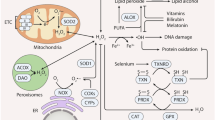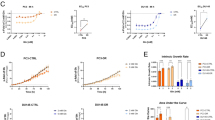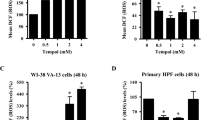Abstract
Reactive oxygen species (ROS) are involved in a diversity of important phenomena in the process of tumor development. To investigate the alterations of oxidative stress and their related systems in tumor progression, a variety of components in the antioxidative stress defense system were examined in prostate cancer cell lines, PC3 and LNCaP. Cell surface molecules involved in metastasis were expressed highly in PC3 cells compared with LNCaP cells, and strong invasion ability was shown in PC3 cells only. ROS level in LNCaP cells was twice higher than that in PC3 cells, although nitric oxide (NO) level was similar between the two cell lines. The content of GSH increased up to about 2-fold in PC3 compared with LNCaP. Activities of glutathione reductase, thioredoxin reductase, and glutathione S-transferase except catalase are significantly higher in PC3 cells than in LNCaP cells. Furthermore, oxidative stress-inducing agents caused down-regulation of GSH and glutathione S-transferase much more significantly in LNCaP cells than in PC3 cells. These results imply that malignant tumor cells may maintain low ROS content by preserving relatively high anti-oxidative capacity, even in the presence of stressful agents.
Similar content being viewed by others
Article PDF
Author information
Authors and Affiliations
Rights and permissions
This is an Open Access article distributed under the terms of the Creative Commons Attribution Non-Commercial License (http://creativecommons.org/licenses/by-nc/3.0/) which permits unrestricted non-commercial use, distribution, and reproduction in any medium, provided the original work is properly cited.
About this article
Cite this article
Lim, HW., Hong, S., Jin, W. et al. Up-regulation of defense enzymes is responsible for low reactive oxygen species in malignant prostate cancer cells. Exp Mol Med 37, 497–506 (2005). https://doi.org/10.1038/emm.2005.62
Published:
Issue date:
DOI: https://doi.org/10.1038/emm.2005.62
Keywords
This article is cited by
-
A heterometallic ruthenium–gold complex displays antiproliferative, antimigratory, and antiangiogenic properties and inhibits metastasis and angiogenesis-associated proteases in renal cancer
JBIC Journal of Biological Inorganic Chemistry (2018)
-
Blood and tissue nitric oxide and malondialdehyde are prognostic indicators of localized prostate cancer
International Urology and Nephrology (2012)
-
Association of Pb, Cd, and Se Concentrations and Oxidative Damage-Related Markers in Different Grades of Prostate Carcinoma
Biological Trace Element Research (2012)



